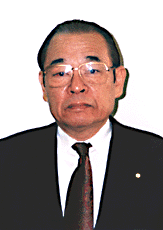Wataru Kubo
Wataru Kubo ( Japanese 久保 亘 , Kubo Wataru ; born January 15, 1929 in Kagoshima Prefecture ; † June 24, 2003 ) was a Japanese politician .
Career
After graduating from Hiroshima University in 1952, he worked as a teacher in Kagoshima Prefecture. In 1963 he was elected to the prefecture assembly. In 1974 he was elected a member of the House of Lords, and in 1988 he was elected Vice-Chairman of the Executive Committee of the Socialist Party of Japan (later renamed the Social Democratic Party ). In 1993 he was promoted to general secretary of the Social Democratic Party. In January 1996 he became finance minister in the cabinet of Ryūtarō Hashimoto , but only held this post until November of the same year. 1997 Kubo left the Social Democratic Party due to disagreements with party leader Takako Doi. In 1998 he was involved in the enlarged re-establishment of the Democratic Party of Japan .
In July 2001, Kubo retired. In November of the same year he received the highest order in the Japanese state, the Great Order of the Rising Sun on ribbon .
Asian Monetary Fund
Kubo proposed a separate Asian currency fund (similar to the International Monetary Fund). He presented this during the Asian crisis in 1997, but met resistance from the IMF and the United States .
| personal data | |
|---|---|
| SURNAME | Kubo, Wataru |
| BRIEF DESCRIPTION | Japanese politician |
| DATE OF BIRTH | January 15, 1929 |
| PLACE OF BIRTH | Kagoshima Prefecture |
| DATE OF DEATH | June 24, 2003 |
